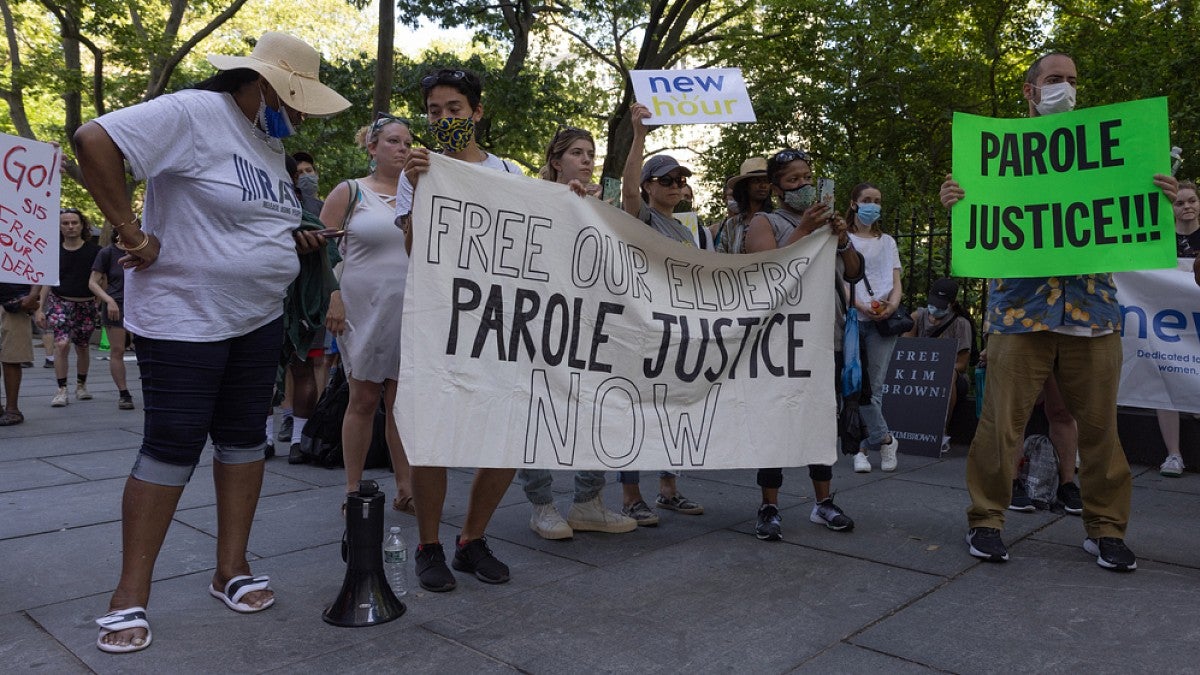UO law professor Kristen Bell met Larry Rosser in prison where he was serving a life sentence with the possibility of parole.
Rosser was convicted of second-degree murder at age 16 for killing an adult woman who had sexually and physically abused him for several years. When Bell decided to represent Rosser at a parole hearing, he had been already been denied parole twice.
With Bell’s help, he was released at his third hearing after having served 23 years.
Bell recounts this case as one, of many, that stands out for how individuals can be failed by the parole system. Bell’s newest research project will use data science to interrogate the way parole decisions are made and to identify opportunities for more just decision-making in the parole process.
“Decision-makers have a problematic amount of discretion in the parole process, which can lead to arbitrary and capricious decisions about who is granted parole,” Bell said.
In Rosser’s case, she stresses that the people presiding over the first two parole hearings didn’t give adequate consideration to the fact that Rosser was both a child at the time of the crime as well as the victim of severe abuse.
“His abuse as a child was deemed part of an ‘unstable social history’ that the parole board cited as a reason to deny parole,” she explained. “But in other cases, the parole board had looked at similar facts in other cases as favorable towards granting parole. Why had the board seen Mr. Rosser’s 16-year-old self as a ‘monster,’ but seen others as vulnerable kids lost in a web of violence?
“Part of the answer likely has to do with race,” she said.
Rosser is a Black man, and in a study Bell published in 2019 she found that Black individuals face worse odds of being granted parole. She reviewed more than 400 transcripts from parole hearings in California to examine which individuals were getting released and which individuals were not. Her research showed that race, ability to hire a private attorney, and other factors beyond a person’s control played a significant role in predicting whether parole would be granted or denied.
“The amount of discrepancy we see in the parole process really underscores the need for some sort of check on decisions,” she said.
Her research, and her representation of Rosser, was funded by a Soros Justice Fellowship and a Senior Liman Fellowship.
Bell’s early research, and her own firsthand observations in prisons as both a lawyer and a teacher, has driven her professional commitment to improving the parole process.
Her new research project aims to provide a check on decisions by using computer science to identify some of the systemic discrepancies that exist in the parole process. And to find some of the individual cases that may have suffered from bias and could benefit from reconsideration.
“The goal of this project is to develop technological tools that provide data-driven opportunities for improving fairness and consistency,” Bell said.
Bell has partnered with computer scientists from Stanford to use machine learning to read transcripts from parole hearings and extract data that will highlight patterns in parole decision-making and individual cases that stand out as anomalies and could benefit from another review.
The program will scan the transcripts for more than 50 data points, including the type of crime, the number of rehabilitative programs individuals participated in during their sentences, the risk assessments and whether parole was granted or denied. The group also had to file a lawsuit against the state of California in order to get race data to include in the study.
“We are using technology to understand what is happening in the parole process and to consider how the law could be improved,” Bell said. “This program reveals patterns that may show systemic problems and flag potential errors or injustices in individual cases.”
The group is analyzing the transcripts from more than 35,000 parole hearings for the study.
Bell has been interested in issues of justice and mercy since she was in college and participated in a bible study at a local prison. She described her participation in that group as a transformative experience and went on to teach a philosophy course at a juvenile hall during graduate school, as well as class on mass incarceration at an adult facility during law school. Part of her interest in joining the UO was its strength in the Inside-Out program, which she hopes to get involved with during her time in Eugene.
Bell is working on a book-length project about her research project. She’s received support from the Oregon Humanities Center for the work. She plans to outline a vision for incorporating technology into the parole process in the book, describe some of the findings from the research, and tell some of the stories about individuals who are denied parole.
“I hope this project gives the public and policymakers a better idea about what’s happening in the parole process and encourages people to demand change.”
—By Emily Halnon, University Communications


